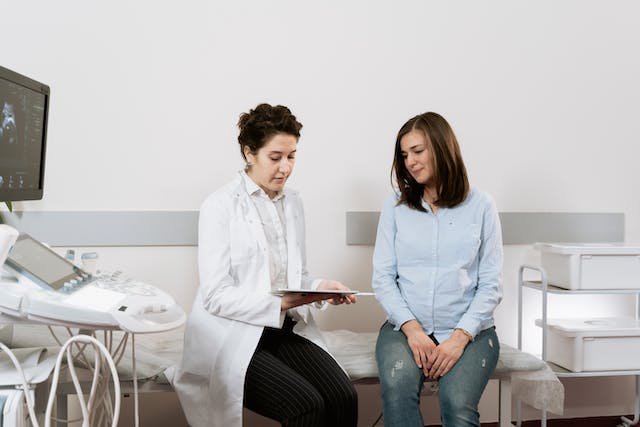According to a new Ipsos poll, about 45% of American women are skipping preventive care services due to towering out-of-pocket costs and the complexity of booking an appointment. However, neglecting these routine checkups can have severe consequences for long-term health.
Women should prioritize the following preventive health appointments, each playing a pivotal role in early detection and intervention.
Pap Tests
Pap tests or pap smears help doctors find signs of cervical cancer early. Here’s how it goes: a small sample of cells is taken from the cervix and sent to a lab. Scientists there check for two things:
- Presence of HPV
- If the uterine cells show any strange changes, that might mean cervical cancer is starting.
Getting pap tests is super important. They start around age 21 and happen every three years. When women hit 30, there’s an extra check for HPV along with the pap smear. If both tests are normal, they only need another check every five years. This routine keeps going until they reach 65.
Catching any hint of cervical cancer makes it easier to treat. So, skipping these regular checks is something you’d want to avoid. It’s a simple way to care for your health, ensuring everything is okay down there.
Mammograms
Mammograms are essential in spotting any early signs of breast cancer. Experts stress how crucial this test is, especially considering that up to 1 in 8 women might face breast cancer at some point in their lives.
Typically, most women begin their mammograms around the age of 40. After that, they usually repeat the procedure every one to two years. However, timing can depend a lot on how likely someone is to get breast cancer.
For example, women who have a special kind of risk, like a family history of breast cancer or a gene called BRCA, might need to start their mammograms earlier, maybe in their 20s or 30s. These individuals are considered high-risk and might also have to do extra tests like MRI scans or ultrasounds to ensure there’s no sign of cancer.
Generally, most health insurance plans cover the cost of routine mammograms. For example, private fee-for-service plans are a type of Medicare Advantage plan that allows individuals to receive services from any Medicare-approved provider that accepts the plan’s terms and conditions. Check out the PFFS overview to know more.
Routine Blood Work
Routine blood work is a crucial aspect of preventive healthcare that enables doctors to assess various aspects of an individual’s health. This comprehensive screening involves measuring lipids, cholesterol, and blood sugar levels and performing a complete blood count (CBC).
The results of routine blood work provide valuable insights into a person’s overall well-being and can help identify potential disorders or chronic conditions.
Lipid and cholesterol levels are essential indicators that can point to issues such as cardiovascular disease. The American Association of Clinical Endocrinology recommends regular screening for lipid disorders for women at normal risk every one to two years, starting at age 55.
For women with diabetes, annual screening is advised. Additionally, women with a family history of elevated cholesterol, heart attack, or sudden death should discuss appropriate screening measures with their healthcare provider.
Blood sugar level screening is another critical component of routine blood work, with a general recommendation for women to undergo this test around age 35. However, individuals with a family history of diabetes or a personal history of gestational diabetes may need to start screening earlier.
Moreover, while there’s no set schedule for complete blood count tests, individuals are advised to schedule blood work if they experience any abnormal symptoms. People are generally recommended to have routine blood work done every three years.
Mental Health Screening
Depression is a prevalent mental health concern, affecting a significant portion of the population. Evidence suggests that approximately 1 in 10 women in the United States have experienced symptoms associated with depression.
Furthermore, the postpartum period is recognized as a critical time for mental health screenings, as up to 1 in 8 women may develop depression after giving birth. These statistics underscore the importance of regular screenings to identify and address mental health issues promptly.
These screenings can be conducted by primary care physicians, community centers, or clinics, typically involving a brief questionnaire. The questionnaire often explores various aspects of mental health, including mood, sleep patterns, energy levels, and changes in appetite.
For women aged 18 and older, routine screening for depression is recommended at least once a year. However, the frequency of these screenings may vary based on comorbid conditions, individual risk factors, and life events.
Colon Cancer Screening
Colon cancer can be treated if it’s detected early. The earlier it’s detected, the less complicated and extensive the treatment needs to be. The primary method for detecting colon cancer is through a procedure called a colonoscopy.
Generally, routine colonoscopies are recommended for everyone starting at 45. If the results are normal, you won’t need another one for 10 years. However, more frequent screenings will be advised if polyps are found during a colonoscopy.
There are also different types of stool tests available. Some must be done annually, while others can be completed every three years. The frequency may depend on factors like age, health history, and the specific type of stool test your healthcare provider recommends.
Conclusion
The significance of regular screenings, including mammograms, routine blood work, mental health checkups, and colon cancer screenings, cannot be overstated. These appointments empower women to take charge of their health, providing early detection and intervention opportunities. These preventive measures are investments in a healthier, happier future.
